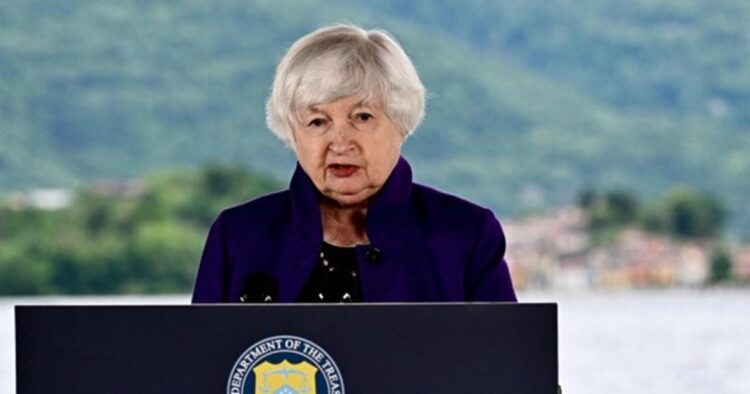The United States Treasury Secretary, Janet Yellen, has put forward a plan for G7 leaders to consider in June to support Ukraine. The plan involves using income from frozen Russian assets to provide a substantial loan to Ukraine.
Yellen emphasized that while this plan is the main option being considered, other possibilities are not being ruled out for the future.
At the conclusion of a G7 finance meeting in Italy, Yellen stated that the plan has garnered significant support among member nations. However, she highlighted the need for endorsement from the 27-member European Union for it to materialize.
The frozen assets, totaling around $300 billion and primarily held in Europe, have been inaccessible since February 2022.
Yellen estimates that such a loan could offer Ukraine as much as $50 billion upfront, demonstrating to Russia that Ukraine, with support from the EU and the US, possesses sufficient resources to defend itself. Nonetheless, she cautioned that the plan requires further development and EU endorsement before it can proceed.
ALSO READ: “G7 Plans to Utilize Frozen Russian Assets for Ukraine Aid”
The G7 finance ministers and central bank governors have committed to exploring avenues to utilize the income from frozen Russian assets to assist Ukraine. A draft statement, expected to be released following the meeting, outlines the group’s intentions to pursue this course of action.
Yellen emphasized the importance of fleshing out the proposal within the EU, given the multitude of countries involved. She stressed that while progress has been made, it is premature to consider the plan a done deal.
Over the coming weeks, G7 finance leaders will dedicate significant efforts to refining the proposal for consideration at the upcoming G7 summit in Italy’s Puglia region in June.
Concerns Over China’s Economic Policies
Additionally, discussions on supporting Ukraine, G7 finance ministers have expressed widespread apprehensions regarding China’s substantial subsidies for advanced manufacturing. They have underscored the potential adverse effects of these policies on their own economies and have committed to closely monitoring the situation.
Yellen noted the possibility of countries resorting to trade measures to counteract China’s industrial policies, reflecting the group’s shared concerns. Moreover, she highlighted the necessity for judicious action to address these challenges effectively.
The announcement comes amid escalating tensions between the US and China, with the former imposing tariffs on various Chinese imports, including electric vehicles, solar products, and semiconductors.
Yellen clarified that these tariffs, targeting $18 billion worth of imports, are intended to be focused and not broad in scope.
Despite concerns over potential retaliation from China, Yellen expressed hope for a measured response from the Chinese authorities. The US-China trade relationship remains significant, with substantial volumes of goods exchanged between the two countries annually.

















Comments